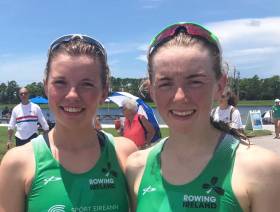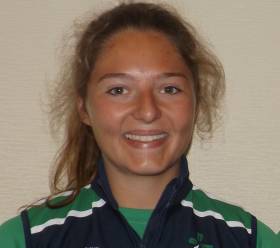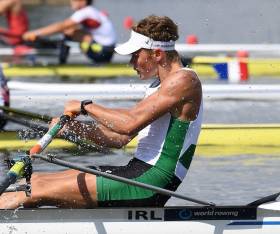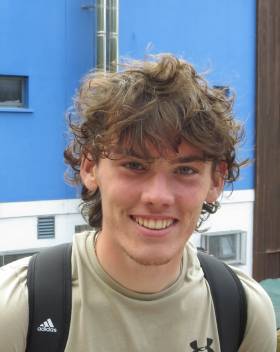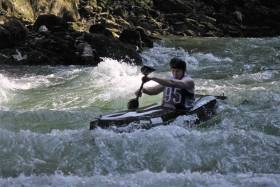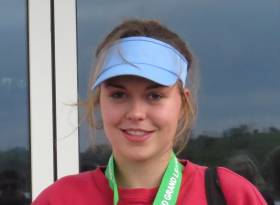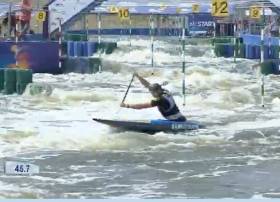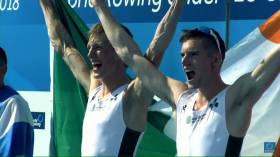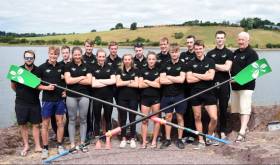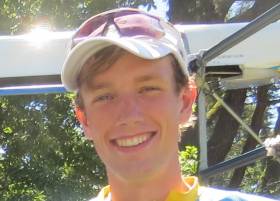Displaying items by tag: World Under23 Championships
Fourth for Casey and Nolan at World Under-23 Championships
#Rowing: Ireland took fourth in the lightweight women’s double at the World Under-23 Championships in Florida. Aoife Casey and Cliodhna Nolan raced from sixth to fourth in the second half of this A Final, which was won well by Switzerland from the Netherlands and Germany.
World Rowing Under-23 Championships, Sarasota Bradenton, Florida (Irish interest)
Women
Four – A Final: 1 Britain 6:34.22, 2 Ireland (C Feerick, E Lambe, T Hanlon, E Hegarty) 6:35.68, 3 United States 6:39.89.
Lightweight Double Sculls – A Final: 1 Switzerland 7:03.83, 2 Netherlands 7:09.45, 3 Germany 7:09.56; 4 Ireland (A Casey, C Nolan) 7:15.40.
#Rowing: Ireland took a silver medal at the World Rowing Under-23 Championships today through the women’s four of Claire Feerick, Eimear Lambe, Tara Hanlon and Emily Hegarty, who swapped into the stroke seat for Lambe.
Britain and Ireland swept into the lead early and were clear of the rest in the final quarter. Britain found just enough to beat Ireland by 1.46 seconds.
World Rowing Under-23 Championships, Sarasota Bradenton, Florida (Irish interest)
Women
Four – A Final: 1 Britain 6:34.22, 2 Ireland (C Feerick, E Lambe, T Hanlon, E Hegarty) 6:35.68, 3 United States 6:39.89.
Ireland Take Bronze Medal at World Under-23 Championships
#Rowing: The Ireland lightweight men’s quadruple of Eoin Gaffney, Hugh Sutton, Ryan Ballantine and Miles Taylor took a bronze medal today at the World Under-23 Championships in Sarasota Bradenton in Florida.
Italy made a tremendous start. They pushed clear of the other five crews and led all the way to the finish line. France and Ireland slugged it out behind them, with the French closing on Italy coming to the line. Ireland also finished fast, but while they overlapped France they could not catch them.
World Rowing Under-23 Championships, Sarasota Bradenton, Florida (Irish interest)
Men
Four, coxed – B Final (places 7 and 8): 1 Ireland (B O’Rourke, R Corrigan, D Lynch, J Quinlan; cox: E Finnegan) 6:18.43, 2 Germany 6:22.17.
Lightweight Quadruple Sculls – A Final: 1 Italy 5:59.12, 2 France 6:00.20, 3 Ireland (E Gaffney, H Sutton, R Ballantine, M Taylor) 6:01.98.
Ireland Keep Germany at Bay at World Under-23 Championships
#Rowing: The Ireland men’s coxed four won their B Final and finished seventh overall at the World Under-23 Championships in Sarasota Bradenton in Florida today.
Germany were the sole other contenders in this race. Ireland’s Brion O’Rourke, Ross Corrigan, Daire Lynch, James Quinlan and cox Eoin Finnegan got ahead of them early and did not yield.
They extended their advantage to just over a length and held it to the finish line.
World Rowing Under-23 Championships, Sarasota Bradenton, Florida (Irish interest)
Men
Four, coxed – B Final (places 7 and 8): 1 Ireland (B O’Rourke, R Corrigan, D Lynch, J Quinlan; cox: E Finnegan) 6:18.43, 2 Germany 6:22.17.
Odhran McNally Takes Fifth in World Under-23 Final
#Canoeing: Odhran McNally took fifth place in the men’s Under-23 K1 sprint final at the Wildwater World Junior and Under-23 Championships in Banja Luka in Bosnia and Herzegovina today.
The 22-year-old Irishman finished in 56.54 seconds, just 3.24 seconds behind gold medallist Anze Uranakar of Slovenia.
Wildwater Canoeing Under-23 World Championships, Banja Luka, Bosnia and Herzegovina (Irish interest)
Men
K1 Sprint Final: 1 A Urankar (Slovenia) 53.30; 5 O McNally (Ireland) 56.54
#Rowing: The Ireland women’s four qualified for the A Final at the World Rowing Under-23 Championships in Florida. The crew of Claire Feerick, Emily Hegarty, Tara Hanlon and Eimear Lambe won their repechage – by far the fastest of two – by leading all down the course.
The lightweight men’s quadruple also won their preliminary race for lanes. They were ahead through all the four quadrants of the race and won by a length from France.
The men’s coxed four finished fifth in their repechage. They lost out on the fourth and final qualifying place in the A Final by .49 of a second. Britain and New Zealand passed early leaders South Africa to take first and second, with the South Africans taking third.
Aoife Casey and Cliodhna Nolan had finished fourth in their heat of the lightweight double sculls.
World Rowing Under-23 Championships, Sarasota Bradenton, United States (Irish interest)
Men
Four, coxed – Repechage (First Four to A Final; rest to B Final): 1 Britain 6:12.79, 2 New Zealand 6:13.53, 3 South Africa 6:14.32, 4 United States 6:15.07; 5 Ireland (B O’Rourke, R Corrigan, D Lynch, J Quinlan; cox: E Finnegan) 6:15.56.
Lightweight Quadruple – Preliminary Race: 1 Ireland (E Gaffney, H Sutton, R Ballantine, M Taylor) 6:02.20
Women
Four – Repechage (First Two to A Final; rest to B Final): 1 Ireland (C Feerick, E Hegarty, T Hanlon, E Lambe) 6:37.88, 2 China 6:41.23.
Lightweight Double Sculls – Heat One (First two to A Final; rest to Repechage) 1 Switzerland 6:59.78, 2 Germany 7:02.65; 4 Ireland (A Casey, C Nolan) 7:07.28, 5 Britain (1 F Chestnutt) 7:13.48.
#Canoeing: Ireland’s Liam Jegou took bronze at the canoe slalom World Championships in Krakow, Poland.
Liam Jegou looked well on course in the final of the C1 – only to touch gate 14. This pushed him out of gold medal place, but his raw time was so good that he finished third behind two France paddlers, Nicolas Gestin and Lucas Roisin.
Canoe Slalom Under-23 World Championships, Krakow (Irish interest)
Men, C1 Semi-Final: 4 L Jegou 93.79
Final: 3 Jegou 91.97.
Gold and Silver For Ireland Under-23 Crews on Special Day
#Rowing: Ireland took gold and silver at the World Under-23 Rowing Championships in Poznan, Poland, today. The Ireland lightweight pair of David O’Malley and Shane Mulvaney showed tremendous self-belief to take the gold. Italy seemed set to dominate their final, but Ireland and Greece moved on them before the 1500 metre mark. Italy could not deal with the speed of their opponents and fell back to third. Greece would not give in easily, but Ireland, who took bronze last year, would only settle for the gold and won by two-thirds of a length.
The lightweight quadruple of Miles Taylor, Niall Beggan, Ryan Ballantine and stroke Andrew Goff produced quite a turn of speed to take their silver.
They looked well off the main action in the first half – they were sixth at 1,000 metres. But in the third quarter they charged – and continued that charge to the finish, where only Italy could hold them off.
The women’s pair of Emily Hegarty and Tara Hanlon were out of contention in their B Final. The lightweight double of Lydia Heaphy and Margaret Cremen looked very good in the early stages of their race but faded to fifth and will compete in a B Final.
Ireland have two A Finals to look forward to on Sunday. Ronan Byrne, in the single sculls, and the lightweight double of Fintan and Jake McCarthy both finished second in their semi-finals.
World Under-23 Rowing Championships, Day Four, Poznan, Poland
Men
Lightweight Pair – A Final: 1 Ireland (S Mulvaney, D O’Malley) 6:54.48, 2 Greece 6:56.24, 3 Italy 7:00.07.
Lightweight Quadruple Sculls – A Final: 1 Italy 6:10.13, 2 Ireland 6:11.45, 3 United States 6:12.55.
Lightweight Double Sculls – Semi-Finals (First Three to A Final; rest to B Final) 1 Spain 6:41.66, 2 Ireland (F McCarthy, J McCarthy) 6:42.45, 3 New Zealand 6:44.17.
Single Sculls – Semi-Final (First Three to A Final; rest to B Final): 1 United States (B Davison) 7: 14.65, 2 Ireland (R Byrne) 7:17.88, 3 Germany (M Weber) 7:24.24.
Lightweight Single Sculls – D Final (Places 19 to 24): 2 Ireland (H Sutton) 7:21.95.
Women
Pair – B Final (Places 7 to 12): 6 Ireland (E Hegarty, T Hanlon) 7:51.20.
Lightweight Double Sculls – Semi-Finals (First Three to A Final; rest to B Final): 1 Italy 7:24.69, 2 Australia 7:30.08, 3 Greece 7:31.23; 5 Ireland (L Heaphy, M Cremen) 7:47.66.
#Rowing: Ireland qualified two more boats at the World Under-23 Rowing Championships in Poznan, Poland.
Ronan Byrne won his heat of the single sculls. The UCC man led by two seconds after 500 metres and extended his lead through the race – he won by 7.31 seconds from Germany’s Marc Weber. The top four qualified for the quarter-finals.
The Ireland women’s pair of Emily Hegarty and Tara Hanlon took their place in the semi-finals with a solid third place in their heat. Britain – with ex-Ireland rower Hannah Scott in the stroke seat – took the race on early, but the United States had other ideas. They took over the lead and held it. Ireland won a battle with Spain for the third qualification place.
Earlier, the Ireland lightweight pair of David O’Malley and Shane Mulvaney had won their heat.
Under-23 World Championships, Poznan, Poland
Men
Lightweight Pair – Heat Two (Winner to A Final; rest to Repechage): 1 Ireland (S Mulvaney, D O’Malley) 6:50.92.
Lightweight Quadruple – Heat One (Winner to A Final; rest to Repechage): 1 United States 6:00.18; 3 Ireland (M Taylor, N Beggan, R Ballantine, A Goff) 6:04.62.
Single Sculls – Heat Five (First Four to Quarter-Finals; rest to Repechage): 1 Ireland (R Byrne) 7:07.77
Lightweight Single Sculls (First Four to Quarter-Finals; rest to Repechage): 5 Ireland (H Sutton) 7:24.38.
Women
Pair – Heat Three (First Three to A/B Semi-Finals; rest to Repechage): 1 United States 7:30.57, 2 Britain (2 H Scott) 7:35.93, 3 Ireland (E Hegarty, T Hanlon) 7:46.45.
#Rowing: David O’Malley and Shane Mulvaney produced an outstanding display to win their heat of the lightweight pair at the World Under-23 Championships at Poznan in Poland today. Germany led the race from the start, but the UCD men had grabbed a firm hold of it by 1,000 metres. They went on to win by 6.69 seconds from Chile, who pipped the Germans for second – a rank that mattered much less than the first place which put Ireland straight through to the final on Saturday.
The Ireland lightweight quadruple had to settle for third in a heat where only the top crew qualified for the A Final. The Ireland crew of Miles Taylor, Niall Beggan, Ryan Ballantine and Andrew Goff looked very good and led early on. The United States moved decisively in the second quarter, when they took a slight lead. They took control in the third. They won well from France, who beat Ireland in a sprint to the line.
Hugh Sutton finished fifth in his heat of the lightweight single sculls and is set for a repechage.
World Under-23 Championships, Poznan, Poland
Men
Lightweight Pair – Heat Two (Winner to A Final; rest to Repechage): 1 Ireland (S Mulvaney, D O’Malley) 6:50.92.
Lightweight Quadruple – Heat One (Winner to A Final; rest to Repechage): 1 United States 6:00.18; 3 Ireland (M Taylor, N Beggan, R Ballantine, A Goff) 6:04.62.
Lightweight Single Sculls (First Four to Quarter-Finals; rest to Repechage): 5 Ireland (H Sutton) 7:24.38.



























